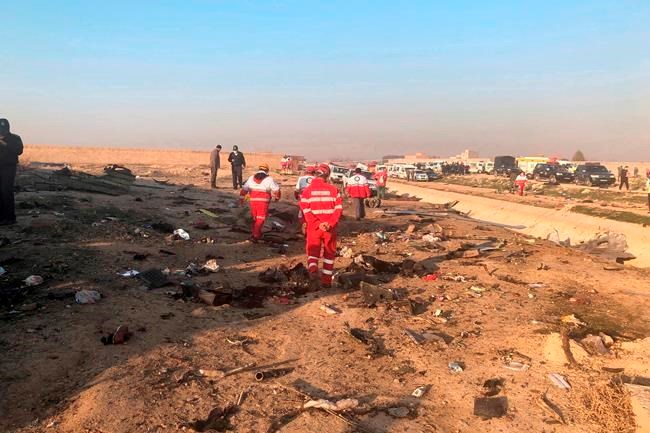OTTAWA — A new report is accusing Iranian authorities of tampering with the electronic devices and misidentifying the remains of some of the passengers killed on Ukrainian Airlines Flight 752.
The findings are among new revelations contained in a lengthy report by the Association of the Families of Flight PS752 Victims that examines the Jan. 8, 2020 shootdown of the commercial airliner by the Iranian military.
All 176 people on board the Kyiv-bound airliner were killed when the Boeing 737-800 was shot down by a surface-to-air missile fired by Iran's Revolutionary Guard minutes after taking off from the Tehran airport.
Those killed included 55 Canadian citizens, 30 permanent residents and dozens of others bound for Canada, as well as nationals of Britain, Ukraine, Afghanistan and Sweden.
Iran initially lied about the cause of the tragedy in the days following but ultimately admitted to shooting down the plane.
The new report says several mobile phones and tablets of dead passengers showed signs of tampering in what could have been an attempt to cover up the cause of the crash.
"One likely explanation is that these electronics may have been bulldozed over in an attempt to destroy any potential evidence that victims recorded in the last minutes of their lives," the report says.
The families enlisted a retired Toronto police homicide detective, Mark Mendelson, whose consulting firm examined a laptop and cellphones returned to the families. He concluded the devices "showed evidence of human manipulation" and showed no evidence of burn patterns or other signs of damage consistent with the plane slamming into the ground.
"The fact that these memory/data components are missing is not consistent with damage caused by a sudden and hard impact. Moreover, the fact that screws were removed and covers pried open strongly suggests that concerted efforts were made to extract these components, rendering a review of data impossible."
The report also says Iranian authorities botched the identification of some of the victims, a revelation that will only increase the pain and suffering of their loved ones.
"The association has obtained evidence that DNA testing on some victims' bodies did not match their stated identification by Iranian authorities," the report says.
"This neglectfulness on the part of the government of Iran has had serious psychological consequences for families, some of whom did not receive the whole bodies of their loved ones and were given the remains of other victims instead."
The report accused Iranian authorities of a "systematic coverup" of the cause of the crash.
Foreign Affairs Minister Melanie Joly joined counterparts from Sweden, Ukraine and the United Kingdom, collectively known as the International Co-ordination and Response Group for the victims of Flight PS752, in criticizing Iran's refusal to meet this week to negotiate reparations.
"We remind the Islamic Republic of Iran that it must fulfil its international legal responsibility to make full reparations to the group of countries and thus reiterate our call to negotiate in good faith and to do so before the end of the year," the group said in a joint statement Wednesday.
"Should Iran continue to avoid negotiating with the group, the co-ordination group will have no choice but to seriously consider other actions and measures to resolve this matter within the framework of international law."
The airliner was shot down during a period of high tension after Iran launched missile attacks on bases in Iraq where American troops were stationed. Iran said it was retaliating for a U.S. drone strike that killed Iran's top military commander days earlier.
The report says Iran's claim that it closed its western skies as a preventive measure was false because flight tracking data showed other passenger planes in the air before the tragedy.
The report also says a leaked audio file of a meeting between Iran's former foreign minister with other top officials, including senior military figures, shows an effort "to publicly propagate the narrative that Flight PS752 had crashed due to a technical failure."
Wednesday's report builds on previous criticism that Canadian authorities have heaped on the Iranian regime, including the fact it dragged its heels for months before releasing the flight recorders.
In March, the Iranian Civil Aviation Organization blamed "human error" for the incident, saying an operator fired two surface-to-air missiles after misidentifying the Boeing 737-800 as a "hostile target" and despite not getting a green light from superiors, per procedure.
The Canadian government rejected the Iranian report, calling it as "incomplete" and devoid of "hard facts or evidence."
"The families of the victims of Flight PS752 are resolute in finding the truth and seeking justice," writes Hamed Esmaeilion, the president of the victims' families association in Wednesday's report.
In the report, he reiterates the view of the association that Canada and the other countries that lost nationals on the plane must use "all available means, including the International Court of Justice (ICJ) and the International Criminal Court (ICC), to bring the perpetrators of this crime to justice."
Speaking at a news conference Wednesday to release the report, Esmaeilion said the association demands an impartial, international investigation.
"There are still numerous unanswered questions. We need to get the truth to get the closure. I cannot describe … what we have been through over the last two years," he said.
This report by The Canadian Press was first published Nov. 24, 2021.
Mike Blanchfield, The Canadian Press



